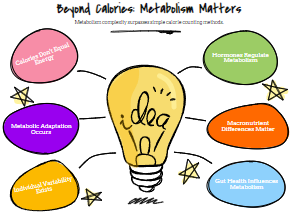
Why Calorie Math Fails Your Metabolism
Why Calorie Math Fails Your Metabolism
I spent the first decade of my career believing in a simple equation: calories in minus calories out equals weight loss or gain. The First Law of Thermodynamics seemed irrefutable – energy cannot be created or destroyed, only transformed. But something wasn't adding up. Why did some clients meticulously counting calories struggle while others thrived on entirely different approaches?
My journey into metabolic health revealed a startling truth: applying physics equations to human biology creates a fundamental misunderstanding of how our bodies work.
When Physics Gets Biology Wrong
The Calories In, Calories Out (CICO) model emerged from early experiments with bomb calorimetry – essentially burning food in sealed containers to measure energy release. These experiments gave us the calorie as a unit of measurement, but something crucial was lost in translation: humans aren't combustion chambers.
I discovered that treating the body as a closed thermodynamic system ignores the complex biochemistry happening inside us. While the First Law of Thermodynamics remains true, its application to metabolism represents an oversimplification that borders on scientific malpractice.
The body doesn't just burn or store calories indiscriminately. It processes different nutrients through distinct biochemical pathways.
Your Cells Know the Difference
Diving deeper into cellular metabolism changed everything for me. The Krebs Cycle, a cornerstone of energy production, handles carbohydrates, fats, and proteins differently. Each macronutrient follows unique metabolic pathways with varying hormonal responses and energy yields.
What fascinated me most was learning about the Randle Cycle – the competition between glucose and fatty acids for oxidation in muscle and adipose tissue. This metabolic process directly contradicts the notion that all calories are created equal.
When insulin levels rise after consuming carbohydrates, fat oxidation decreases regardless of your overall caloric balance. Your body isn't just counting calories; it's responding to hormonal signals that determine substrate utilization and energy storage.
Hormones: The Missing Variable
The CICO equation falls apart when we consider hormonal responses to different foods. Insulin doesn't just regulate blood glucose – it's a primary regulator of fat storage and utilization. The same number of calories from different sources can trigger dramatically different insulin responses.
I've seen this play out countless times with clients. Two individuals following identical calorie prescriptions experience entirely different outcomes based on their hormonal environments. The person with insulin resistance will store more energy as fat despite perfect adherence to calorie targets.
Leptin and ghrelin – hormones controlling hunger and satiety – further complicate the picture. These powerful chemical messengers aren't factored into the CICO model at all, yet they fundamentally determine how much we eat and how our metabolism responds.
When Bodies Fight Back
Perhaps the most compelling evidence against CICO comes from adaptive thermogenesis – the body's remarkable ability to adjust metabolic rate in response to caloric restriction.
Research has shown that following weight loss from calorie restriction, base metabolic rate often decreases beyond what would be predicted by changes in body composition alone. The body literally fights to maintain energy homeostasis by becoming more efficient with available energy.
This explains the frustrating plateau and rebound weight gain my clients experienced with traditional dieting approaches. Their bodies weren't violating the laws of physics – they were responding precisely as biology dictates.
Beyond Calorie Math
Understanding these metabolic nuances has transformed my approach to nutritional science. I no longer view the body as a simple mathematical equation but as an intricate biochemical system with dynamic responses to food quality, macronutrient composition, and meal timing.
This isn't to say that energy balance doesn't matter – it absolutely does. But the mechanisms governing that balance are far more complex than simple arithmetic.
Our metabolism operates more like an intelligent regulatory system than a calculator. It adjusts hormonal signaling, enzyme activity, and even gene expression based on the types of foods we eat, not just their caloric value.
A New Metabolic Paradigm
Moving beyond CICO requires embracing metabolic complexity. Instead of focusing exclusively on caloric intake, I've found greater success helping clients understand how different foods affect their unique metabolic responses.
For sustainable metabolic health, we need approaches that work with our biology rather than treating it as a simple thermodynamic equation. This means considering food quality, hormonal responses, individual metabolic flexibility, and the countless biochemical processes that determine how our bodies utilize energy.
Your body isn't a bomb calorimeter. It's a sophisticated biochemical system that deserves more than simplistic calorie math. The sooner we acknowledge this fundamental truth, the faster we can develop effective strategies for genuine metabolic health.
